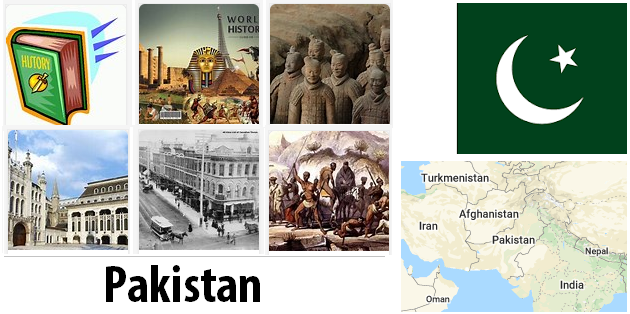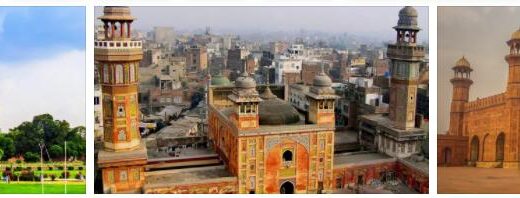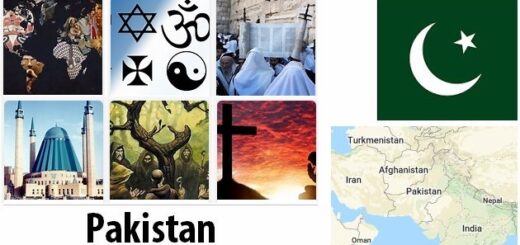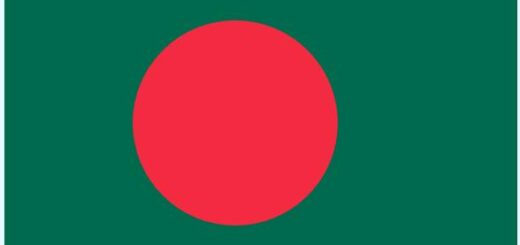Pakistan Recent History
It seems that the name derives from Pa, which is the initial of Pangiab, or Punjab, and from Ki which is the initial of Kascemir, a large region of Pakistan.
The history of this country is recognized in that of India until 23 July 1947 when George VI, king of England, signed the law that recognized the independence of India.
On the following August 15, India was divided into two federal complexes: the Hindu-Hindu and the Pakistan-Muslim.
According to Abbreviationfinder, an acronym site which also features history of Pakistan, Pakistan was recognized as an independent state on the same day. But already towards the end of the nineteenth century the first troubles began: millions of Muslims had come to find themselves in a sea of Hindus, because Hinduism is the religion of most of the Indian people; and a real hostility arose between the followers of the two religions. Years of struggle followed, even bloody, until there was a division of the territory between Muslims and Hindus.
Muslims moved to the territories east and west of India. The Hindus, however, abandoned these territories. Millions of men migrated between massacres, devastations and massacres, during which hundreds of thousands of people died.
Pakistan is therefore a unique geographical and political phenomenon in the world. The two sections in which it is divided are located 1600 kilometers from each other. And they are two territories with different characteristics and also the human element presents decidedly unequal characters. Furthermore, the two peoples are incompatible, they would like to separate. The only thing that unites them is religion.
The western part, larger by extension, includes almost the entire Indus basin and the former British Baluchistan. The eastern one, much smaller, corresponds to the Ganges-Brahmaputra delta.
Since its constitution as a state, Pakistan has been in conflict with Industry for the difficult arrangement of the borders. Particularly delicate matter is Kascemir.
In October 1951 Prime Minister Liaquat Ali Khan was assassinated in Rawalpindi, succeeded by Khwaja Nazimuddin. In the summer there had already been serious unrest in Hyderabad. On April 12, 1952, the Union of States of Baluchistan was formed to merge the four principalities of Kalat, Hharan, Lasbela and Mekran into a single state.
In April 1953 in Nazimuddin he succeeded the Mohammed Ali government; in August the government of Pakistan agreed with that of India for Kascemir, with a plebiscite; and Kascemir was annexed to the Industry.
The Republic of Pakistan is formally associated with the British Commonwealth; it has a federal parliament and two provincial assemblies. The temporary capital Rawalpindi will be replaced by Islamabad as soon as construction is completed. There are two national languages: Urdu in the west and Bengali in the east.
In the first decades of life there were major economic and political troubles in Pakistan. They also snapped secessionist movements, especially in the Bengal area, where the first general elections of 1954 saw the defeat of the Muslim League and the rise of the United Front of the oppositions.
The absolute main point of this Front was the achievement of full autonomy in eastern Pakistan. The Muslim League accused the Front of wanting to sell the area to India and therefore sent a governor with full powers to the place and this was General Skandar Mirza.
To stem the breakaway push of Bengal, press freedom was prohibited and the Communist Party was banned. Then it was decided to give the region a different administrative structure but as close as possible to that of the rest of the country, so as not to create dangerous regionalisms.
In the year 1954, serious disagreements arose between the governor general of Pakistan, general Gulam Mohammed, and the Constituent Assembly, led by the incapable Muslim League. The Assembly, sensing the dangerousness of the governor’s attitudes, tried to limit his powers, but he proclaimed a state of emergency in the country, also being able to count on the loyalty of the army. Then he appointed a government chosen by himself. The Supreme Court of Sin intervened to try to restore the previous situation; however, the Federal Court suspended all attempts and this still marked a point against the Muslim League.
On August 5, 1955 Gulam Mohammed resigned due to illness and General Iskandar Mirza was elected in his place. In March 1956 he was elected President of the Islamic Republic of Pakistan.
A constitution was launched but for two more years the order could not be settled as the institutions had not been able to level themselves to the new course. Then Mirza repealed the Constitution on 8 October 1958 and instead imposed martial law, then exonerated all the ministers in office and dissolved the regional assemblies after dissolving the national one. It also prohibited all political activity and informed the population of the need for these drastic measures by charging them for rampant corruption.
A few days later he resigned leaving power in the hands of the head of the armed forces, Mohammed Ayyub Khan, who immediately formed a government composed of both military and civilians and assumed command as president. A year later he promulgated a decree in which he proclaimed a political order called “fundamental democracy”.
In the meantime, some serious problems of the country had been resolved so that the president, two years later, voted by secret ballot, obtained the majority of the consents.
In foreign policy there was a certain easing of tensions with India, always on the question of Kascemir and, in any case, it tended to be pro-western. To confirm this there were mainly requests for help made by the country to the United States.
On March 1, 1962, a new Constitution was launched: power was centralized entirely in the hands of the President; martial law was revoked and political parties were admitted again. Then relations with the United States cooled down a bit and they turned more towards China instead. Less important were those with the Soviet Union. Then relations with the United States were definitively dissolved when they supplied India with weapons, which in turn took advantage of it in their 1965 conflict.
In this same year Ayyub was reconfirmed as president and the Muslim League was strengthened. But things did not go well especially for the bad distribution of privileges and so the agitations began, especially by the students, for all the failure to announce reforms. The head of all oppositions was ZA Bhutto, who had been Foreign Minister until 1966 and then founder of the People’s Party.
In a flood of conflict and unrest, Ayyub left power on March 25, 1969 and was replaced by General Yahya Khan, who repealed the Constitution, re-proposed martial law and dissolved the Assemblies. Then he strengthened relations with China and the elections of December 7, 1970 recorded the grandevictory of the Bengal autonomists and that of the Bhutto People’s Party in western Pakistan. However, as no agreement was reached between the two sides, civil war broke out in Bengal in March 1971. And here the rebels proclaimed the Republic of Bangla-Desh.
Yahya Khan did everything to restore order but to no avail. Then to avoid a truly catastrophic situation, India came to the field in aid of the Bengal guerrillas on 13 December 1971. The war lasted two weeks and then Pakistani troops capitulated and had to accept the armistice on the western front.
Yahya Khan resigned. Bhutto came to power: he immediately tried to avoid financial collapse by recovering the capital emigrated abroad; made various reforms in the field of social security, trade union rights but above all improved land reform.
He distributed to the peasants the lands removed from those who had too many; introduced free education; nationalissized all the schools and finally the banks.
On April 10, 1973 the new Constitution was promulgated. Bhutto was Prime Minister and the president was Chaudri Fazl-Ilahi. But in 1974 Bangla-Desh was officially recognized.
General elections were held in March 1977 and the ruling party had a majority. However, suspected of fraud, the opposition asked that they be canceled and repeated. Bhutto refused to do so, a civil war still arose which culminated in a coup on 5 July. Military forces, led by General Ziaur Rahman imposed martial law, dissolved the government and the Assemblies. Bhutto was arrested and sentenced to death and then executed on April 4, 1979. Martial law remained in force and elections postponed indefinitely.
In the years to come, the government, always run by Ziaur, did not register major political upheavals. Meanwhile, he had promoted the country’s Islamism by introducing laws in accordance with Islamic law and at the end of 1984 he asked for a referendum to have consent to his policy and his election as President for 5 years.
On March 25, 1985 he then assumed this position, partially amended the Constitution, calling for full powers.
In April 1986 Benazir Bhutto, the daughter of the ex-president killed, returned to his homeland and immediately began an opposition policy, creating the Pakistani People’s Party.
In the years 1986/87 there were serious government crises provoked by ethnic and separatist conflicts. Better economic measures were immediately applied and meant that the local elections in 1987 again gave the government confidence. But in May 1988 the situation precipitated. Ziaur was forced to dissolve all assemblies, while ethnic conflicts had passed the guard level. Then, together with the United States ambassador and some military leaders, they perished in a strange plane crash, for which a state of emergency was declared and a provisional government was formed under the leadership of the President of the Senate, Gh. Ishaq Khan.
The subsequent elections were won by the party of B. Bhutto who was elected Prime Minister; the state of emergency was lifted and Ishaq became President of the Republic.
In 1990 Bhutto’s inadequacy for national political and economic cooperation was evident; There were serious disturbances as a result of which the president was forced to dissolve the National Assembly and to lay down B. Bhutto.
For the October elections, the coalition of three parties was needed, as well as those of the senate of 1991. Prime Minister was M. Sharif Khan who removed the state of emergency and called all the parties to collaboration.
Other ethnic clashes occurred putting in paricolo the government of Sharif, who also tried to open a dialogue with B. Bhutto, at the head of the opposition. This demanded a complete rehabilitation and then in 1993 he assumed the position of permanent secretary for foreign affairs. Power struggles broke out between the president of the republic and the prime minister. And they were so serious that the head of the armed forces, with strong pressure, on 18 July 1993 forced them both to resign. Then he called new elections, won by B. Bhutto who returned to being premier and president became one of his most faithful collaborators, F. Leghari.
In the international arena, Pakistan’s policy was mainly directed towards the West, especially towards the United States, from which aid always came. But after the outbreak of the Russo-Afghan war, Pakistan also had to negotiate with the Soviet Union and India, with which it had always opened disputes over the dispute over Kascemir.
Precisely for this region, on the contrary, the contrasts intensified and risked becoming a real world conflict. Various acts of terrorism took place on the Indian border which forced India to intervene militarily. Immediately protests arose in Pakistan which put its troops on alert. But at this point the United States intervened and there were agreements between the two countries, while leaving the problem unsolved.
In 1992 peaceful relations were established with various Islamic countries, including Turkey and Iran. Pakistan, which had already become a member of the British Commonwealth, also became a permanent member of the United Nations Security Council.
The executive, still carrying on the disagreements with President Leghari, could not apply the management of the reforms for the recovery of the economy, as it was unnecessary but indispensable. This led to a somewhat worsened situation in 1995.
In addition, both to eliminate the state deficit and to obtain the data requested by the International Monetary Fund, to which it had turned for strong loans, the government increased taxes, thus sparking protests from all sectors, from opposition to industrialists and traders, from religious to the armed forces. Strikes, protests, demonstrations undermined the credibility of Benazir Bhutto who, moreover, was also held responsible for the killing of his brother, M. Bhutto, his political opponent, which took place in Karachi in September 1996.
With all this, on November 5, 1996, President Leghari, accusing her of abuse of power and maladministration, dismissed her; at the same time her husband, AA Zardari, Minister of Investment, was arrested on charges of corruption.
In February 1997, the elections were held early which assigned the victory to the Pakistan Muslim League, formed in 1993, whose leader Sharif re-elected the executive.
Being able to manage a strong majority, in April 1997 he canceled some amendments to the Constitution, put in place since 1985. And with this he reduced the powers of the President of the Republic, removing him: the possibility of dismissing the premier, of dissolving the Parliament, to appoint the head of the armed forces and the governors of the provinces.
All this certainly did not facilitate the relationship between the two highest offices of the state. Indeed, the controversies escalated to the point that Leghari preferred to resign and in his place was elected MR Tarar, candidate of the Pakistan Muslim League itself.
Having thus strengthened the power of the institutions, Sharif was able to work quietly and: reduced taxes, supported the prices of agricultural and industrial products, worked to attract foreign investments to the country, fought strenuously against terrorism, and in this regard had a special law passed which gave the police wide powers.
In the field of foreign policy, after a period in which relations with the United States concerning the nuclear program had deteriorated, some improvement had started in 1996 and the United States had resumed military supply to the country.
In the same year, Pakistan officially recognized the government formed in Afghanistan while it wanted to propose itself in Central Asia at a certain level, and for this reason intensified cultural and commercial relations with all the former Soviet republics.
On the other hand, those with India with whom there was always a sustained diatribe for both the Kashmir issue and nuclear weapons were not equally flattering. This controversy generated, in February 1996, a national strike in support of the Kashmir independentists, and further on it originated armed clashes between border troops. After that, a relaxed phase seemed to start between the two countries and the two prime ministers began diplomatic talks in September 1997, then suddenly stopped in May 1998. And this is because both countries wanted to carry out nuclear tests, the cessation of which reopened peace talks.
After a few meetings, relations between the two countries were re-established in October 1998 and they also prepared to negotiate the Kashmir issue in an appropriate forum.
In August 1998, Shamir again passed an amendment to the Constitution, whereby the Koran and the Sunna were raised to the supreme state law above the Constitution itself. And with this he settled once and for all the tensions between Sunnis and Shiites.
In the same August the Muhajir Qaumi Movement left the government majority to protest the executive’s inability to curb the ethnic and political abuses that occurred in the Sind area, where some Muslim minorities from India had taken refuge after 1947, The government then assumed direct protection of the region and established a military court with the task of judging and penalizing all acts of terrorism.
During 1999 the Pakistani economic situation was particularly difficult. On October 12 Sharif was exonerated with a coup d’état led by General P. Musharraf who, first suspended the Constitution, then established a National Security Council which he led himself.




